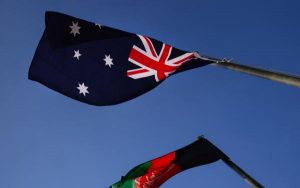At least 16 provincial capitals in Afghanistan are on the brink of falling to the Taliban, with the number of districts controlled by the group having tripled from 73 to 221 since most coalition forces withdrew late last month. Taliban forces have also penetrated some of Afghanistan’s largest cities.
U.S. President Joe Biden has played down the prospect of a complete Taliban takeover, stating that the Taliban force of 75,000 is no match for the 300,000-strong Afghan security forces.
But successive videos released by the Taliban over the last month show triumphant insurgents inspecting district headquarters and seizing American-supplied Humvees, artillery pieces, mortars, heavy machine guns, and other military equipment. The U.S. intelligence community has since suggested that the Afghan government could collapse within six months.
As the Taliban advance, there are concerns that Afghans who helped coalition forces during the two-decade war will face retribution. The Taliban have a record of torturing and executing people who collaborated with coalition forces. The militants routinely send written threats in the form of “night letters” to Afghan interpreters, whom the Taliban tag as “Western slaves.”
Among those at risk are hundreds of Afghan interpreters who assisted Australian soldiers. Now those soldiers, along with senior Australian diplomats and military figures, are urging the Australian government to offer the translators and their families protection visas.
About 1,500 Afghans and their families who aided Australians have been granted visas to Australia since 2013; 230 in just the past month.
Stuart McCarthy, a former Australian Army officer and veteran of the Afghanistan conflict, said while these efforts by the federal government are welcome, the harsh reality is that a similar number remain in hiding or on the run from the Taliban.
“With dozens of Australia’s Afghan employees reportedly already dead and hundreds more left for dead by a dysfunctional Department of Foreign Affairs and Trade bureaucracy, Defence Minister Peter Dutton must step in,” he wrote in The Australian newspaper.
According to McCarthy, an Afghan man who had been engaged with AusAID at the height of Australia’s counterinsurgency campaign has had 15 of his 40 employees murdered by the Taliban, including one who was butchered in front of his home and neighbors for allowing his property to be used by AusAID as an office. Despite this, Foreign Affairs Minister Marise Payne late last month rejected the Afghan man’s visa application.
With McCarthy’s pleas seemingly falling on deaf ears, earlier this week he took to social media and in a video titled “Australia’s badge of shame in flames,” set his Afghanistan campaign medal on fire. He then presented the remains to his local member of Parliament. Several other veterans have joined in on the burning of their service medals in protest of Australia dragging its feet on helping Afghans.
Dutton said the government has taken a “rigorous approach” to granting visas so as to deter those who could be playing “both sides.”
“If we’ve got the wrong person here, somebody who had played both sides, somebody who had worked for us in 2016, 2013, 2010, but had now affiliated with the Taliban, but was wanting to come here because of that earlier support of our Australian troops and they committed an act of atrocity here in Australia,” he said.
Any effort by Australia to verify whether a former aide may be sympathetic to the Taliban and therefore a risk to Australia is hindered by the fact that Australia not only withdrew its forces from Afghanistan but also closed its embassy in the country.
Former Australian Prime Minister John Howard, who first sent Australian forces into Afghanistan in 2001, told SBS news that Australia has a ‘“moral obligations” to help Afghan interpreters.
“Where it is clearly the case that they could be in danger of retribution, we have an obligation to help them, if necessary, by giving them visas to come to live in Australia,” he said.
“That is a moral obligation we have. And it was a moral obligation that was shamefully discarded many years ago when we pulled out of Vietnam. I do not want to see a repetition of that failure in relation to Afghanistan.”

































